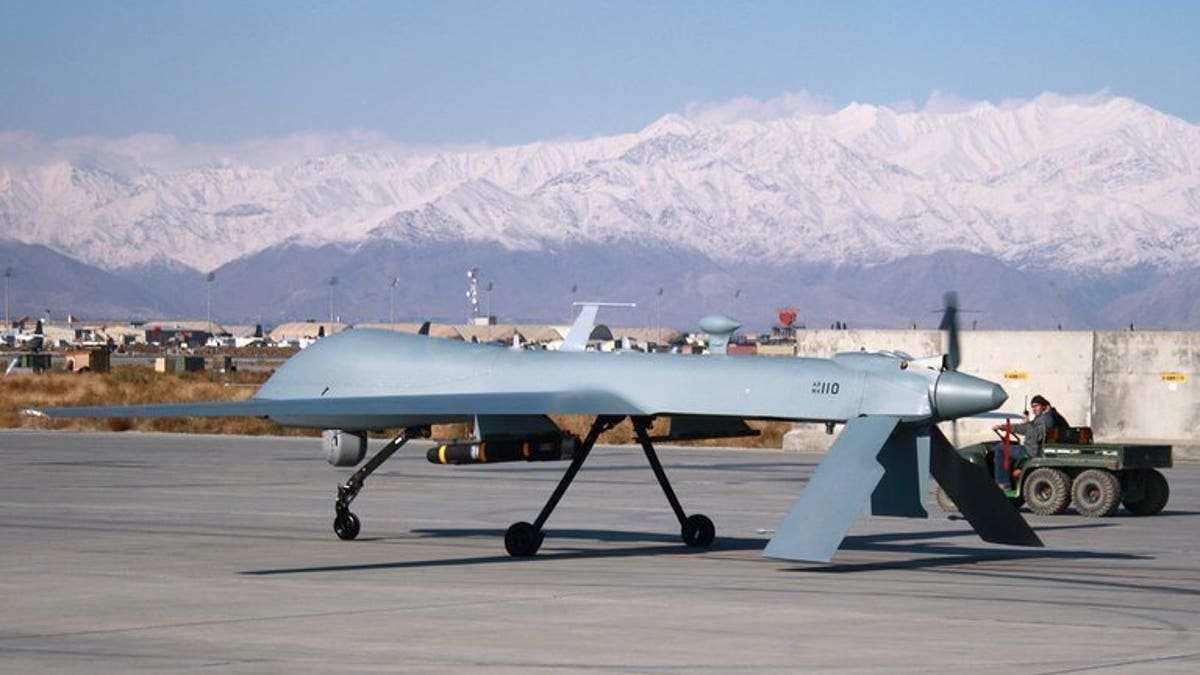
A US Predator unmanned drone armed with a missile at Bagram air base in Afghanistan on November 27, 2009. A US drone has killed four Al-Qaeda suspects in Yemen, a security official said, in the third such strike in five days as the Yemeni president prepared for White House talks. (AFP/File)
ADEN (AFP) – A US drone killed four Al-Qaeda suspects in Yemen Thursday, a security official said, the third such strike in five days as the Yemeni president prepared for White House talks.
Yemen's US-backed campaign against Al-Qaeda in the Arabian Pensinsula (AQAP) was expected to be high on the agenda of Abdrabuh Mansur Hadi's meeting with President Barack Obama later on Thursday.
Washington regards AQAP, a merger of militants in Yemen and neighbouring Saudi Arabia, as the worldwide jihadist network's most active and dangerous branch.
The latest drone strike came in the southeastern province of Hadramawt, where AQAP militants have carried out a string of attacks on army personnel, the Yemeni security official told AFP.
The unmanned aircraft "raided an Al-Qaeda vehicle in the Wadi Ser area destroying it and killing four militants," the official said, speaking on condition of anonymity.
It was the third deadly drone strike in five days to hit Al-Qaeda in Yemen.
On Tuesday, a US drone killed three suspected militants in the southern province of Shabwa. On Saturday, a drone killed six suspected militants in the Mahfad mountains of neighbouring Abyan province.
The United States, the only country to operate drones in the region, has sharply increased its use of them against Al-Qaeda targets in Yemen over the past two years.
US drones strikes in Yemen nearly tripled in 2012 compared to 2011, from 18 to 53, according to the New America Foundation, a Washington-based think-tank.
The jihadists remain active in the south and east of Yemen despite an offensive by the army in summer 2012 that recaptured most of Abyan province's main towns.
AQAP took advantage of the weakness of Yemen's central government during an uprising against now-ousted president Ali Abdullah Saleh in 2011 to seize large swathes of territory across the south and east.
Washington has given strong support to the efforts of Saleh's successor, Hadi, to reassert central government control.
Several key AQAP leaders have been killed in US drone strikes, most recently the group's deputy leader Saeed al-Shehri whose death was confirmed by the jihadists on July 17.
Cooperation against the jihadists was to be high on the agenda of Hadi's talks with Obama later on Thursday, along with the fate of the dozens of of Yemeni Al-Qaeda suspects still held at the US detention centre in Guantanamo Bay, Cuba.
Obama would seek to "further strengthen our counter-terrorism partnership, and enable the return of Yemeni detainees at Guantanamo Bay who have been designated for transfer," the White House said.
Obama imposed a moratorium on the release of Yemeni prisoners after a foiled attempt to blow up a Detroit-bound passenger plane on Christmas Day 2009 was traced back to AQAP.
But on May 23 Obama announced he would lift the moratorium, saying the dossiers of the 56 Yemenis who have previously been cleared for transfer would be examined on a case-by-case basis.
Yemeni Foreign Minister Abu Bakr al-Kurbi said in May his country has already prepared a programme to reintegrate the detainees into society.
Al-Qaeda chief Ayman al-Zawahiri hit out in an audio message posted online on Wednesday at continued "crimes" against Al-Qaeda suspects held in Guantanamo Bay.
Out of 166 inmates at Guantanamo, 80 continue to refuse to eat in a protest that began more than five months ago. The number rose at one point to 106 inmates.
